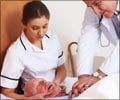
Brothers and sisters of cancer patients have a lot to cope with. They are often worried about the illness and have to watch their sibling's emotional and physical pain. This can lead to confusing and conflicting emotions such as fear, loneliness, sadness, anger, jealousy and guilt. In some children this can eventually lead to the symptoms of post-traumatic stress disorder. A team of researchers from University Children's Hospital Zurich, led by Dr Alice Prchal tested a new educational program designed to give children the skills to cope in the first few months after diagnosis.
The educational program included a three pronged approach over two sessions. Firstly the child was given medical information about how the body works, cancer, and cancer treatment, using pictures and story books. This section of the intervention also focused on emphasizing that cancer was not contagious and that no one was to blame for their sibling's disease. The second section used cognitive behavior therapy and identified specific topics that concerned each child. The final part of the therapy presented parents with a booklet containing information about the concerns of siblings of cancer patients, and provided recommendations on how to support their child.
Families were enrolled into this pilot study over a four year period. They were randomly assigned to either standard support provided by the psycho-oncologist on the ward, or the new educational program, within four to six weeks of the diagnosis of their sibling's cancer. Progress was measured before the program sessions and after four and seven months.
The results of the study were very promising. Dr Prchal explained, "Using a 'quality of life' scale both of the groups showed improved over time, however, despite the small size of our study, the group with the extra help had a better improvement in their psychological well-being."
She continued, "Although the group who tested the educational program were better able to cope in the first few months there seemed to be no differences in anxiety or the numbers of children who suffered from post-traumatic stress disorder. We hope to adjust the program to be able to help these children as well."
Advertisement
Source-Eurekalert














